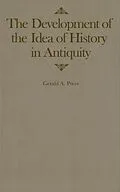An extensive scholarly literature, written in the past century holds that in ancient Greek and Roman thought history is understood as circular and repetitive - a consequence of their anti-temporal metaphysics - in contrast with Judaeo-Christian thought, which sees history as linear and unique - a consequence of their messianic and hence radically temporal theology. Gerald Press presents a more general view - that the Graeco-Roman and Judaeo-Christian cultures were fundamentally alien and opposed cultural forces and that, therefore, Christianity''s victory over paganism included the replacement or supersession of one intellectual world by another - and then shows that, contrary to this view, there was substantial continuity between "pagan" and Christian ideas of history in antiquity, rather than a striking opposition between cyclic and linear patterns. He finds that the foundation of the Christian view of history as goal-directed lies in the rhetorical rather than the theological motives of early Christian writers.
Autorentext
The City University of New York
